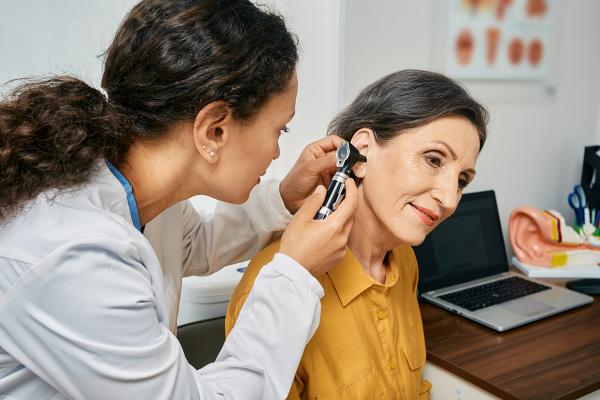
EPIC Hearing Healthcare helps members access hearing exams, hearing aids and more. Sign in to learn more and check eligibility.
This spinning sensation is caused by a problem in the part of the inner ear that controls balance. It might be distracting and even scary. Here’s what to know.

After you reach your 40s, it’s more common to sometimes feel lightheaded or like the room is spinning. In fact, after age 40, about one-third of people have these episodes. And they happen more often as people get older.1
People sometimes think this spinning sensation is related to dizziness. It’s not. Dizziness is when you feel lightheaded, woozy or weak.2 Feeling like you or the room around you is spinning is known as vertigo.
“Vertigo is defined as a hallucination of motion. For most people it is a spinning sensation,” says Eric Smouha, M.D. He’s an otologist and neurotologic surgeon – a specialized ear, nose and throat (ENT) doctor – at ENT and Allergy Associates in New York City.
Those sensations can make you feel like you’re losing your balance. And that makes it more likely that you’ll fall and possibly hurt yourself. Vertigo may also cause hearing loss.3 So, it’s important to get any symptoms checked out.
Here’s what else you need to know about vertigo, including how to treat it.
No. Vertigo is a symptom of other health problems rather than a disease itself. “Most true vertigo results from a problem in the ear or the related connections in the nervous system,” says Dr. Smouha.
The inner ear not only helps you hear. It affects your balance too. Inside your inner ear are:
Let’s say something damages the inner ear or vestibular nerves. It can produce those spinning sensations that may make you feel like you’re going to fall.

EPIC Hearing Healthcare helps members access hearing exams, hearing aids and more. Sign in to learn more and check eligibility.
There are 2 types of vertigo, and each has a different cause.3, 4
Causes of peripheral vertigo include:4
Causes of central vertigo include:4
The main ones: “Spinning, which may occur continuously or in episodes,” says Dr. Smouha. “There may also be hearing loss, usually in one ear, or tinnitus, or ringing in the ear,” he adds. This is especially common with Ménière’s disease.
Other symptoms include:3
Vertigo is best diagnosed and treated by an ear, nose and throat doctor (ENT). These are medical doctors who specialize in conditions that deal with your head and neck.7
“People should see an ENT immediately for sudden hearing loss or sudden onset of vertigo,” Dr. Smouha notes.
An ENT will go over your medical history. They will do a physical exam and run some tests to check what’s causing the spinning sensation. “History is the most valuable,” Dr. Smouha explains.
An ENT will ask you:
For example, maybe you tell your ENT that those spinning sensations are triggered by rolling in bed or tilting your head. And you also feel nauseous. In that case, they may diagnose you with BPPV.5
Or maybe the spinning sensation lasts for hours and you also have hearing loss and ringing in your ears. In that case, the cause could be Ménière’s disease.
An ENT will also do a physical exam. They want to see how well you can balance when you close your eyes and march in place, for example. Or when you stand with your feet together. If the ENT suspects a tumor may be causing vertigo, they might order imaging tests.
Yes, says Dr. Smouha, but usually in one ear only. “A hearing exam will usually be done at the first visit to the ENT’s office,” he adds. Along with the other tests, the cause of the hearing loss and vertigo can be ruled out.
Sometimes the hearing loss is temporary, explains Dr. Smouha. “In Ménière’s disease the hearing loss may fluctuate at first and later may become permanent,” he adds.
If you’re having trouble hearing, you may want to consider getting a hearing aid. Your ENT may refer you to a hearing care professional, such as an audiologist. They can give you a comprehensive test and recommend a hearing aid that’s right for you.
Again, it depends on what’s causing the vertigo. But there are 3 main treatments:
In a few cases, people who have vertigo may need surgery. Sometimes it’s to remove a tumor. Other times, it’s to place a bone plug in the semicircular canal to stop symptoms. This is done if the repositioning exercises didn’t work.
Did you know that many hearing benefits, including a hearing exam and consultation, are covered through EPIC Hearing Healthcare? Learn more.
Sources
Information is for educational purposes only and is not a substitute for the advice of a licensed medical provider. Consult your provider prior to making changes to your lifestyle or health care routine.
Network size varies by market.
Other hearing exam providers are available in the UnitedHealthcare network.